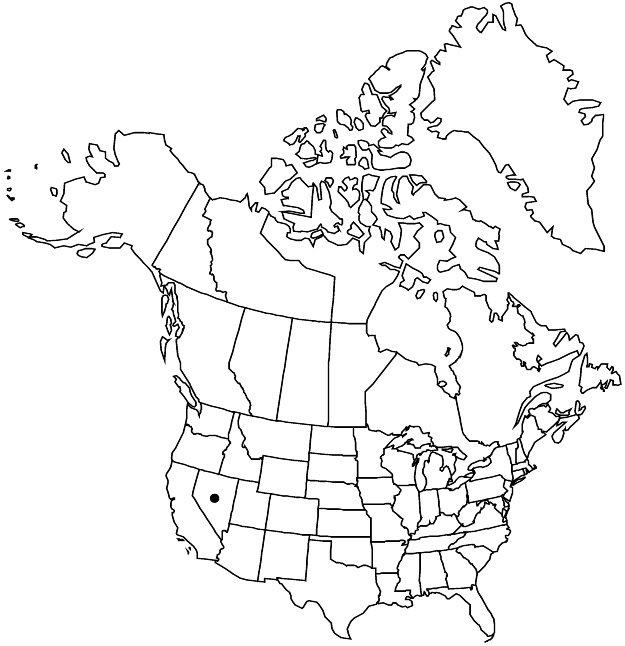Difference between revisions of "Eriogonum lemmonii"
Proc. Amer. Acad. Arts 12: 266. 1877.
FNA>Volume Importer |
FNA>Volume Importer |
||
| Line 24: | Line 24: | ||
|elevation=1300-1700 m | |elevation=1300-1700 m | ||
|distribution=Nev. | |distribution=Nev. | ||
| − | |discussion=<p>Eriogonum lemmonii is rare and localized, only infrequently being locally occasional. It is restricted to the southwestern edge of the pluvial Lahontan Lake basin of northwestern Nevada. It is found mainly in the Silver Springs and Wadsworth areas of Washoe, Churchill, and Storey counties, with outlying populations at the southern end of the Sahwave Mountains (Pershing County) and in Wilson Canyon (Lyon County). It is on the Nevada “watch list” of narrowly distributed endemic species.</p> | + | |discussion=<p><i>Eriogonum lemmonii</i> is rare and localized, only infrequently being locally occasional. It is restricted to the southwestern edge of the pluvial Lahontan Lake basin of northwestern <i>Nevada</i>. It is found mainly in the Silver Springs and Wadsworth areas of Washoe, Churchill, and Storey counties, with outlying populations at the southern end of the Sahwave Mountains (Pershing County) and in Wilson Canyon (Lyon County). It is on the <i>Nevada</i> “watch list” of narrowly distributed endemic species.</p> |
|tables= | |tables= | ||
|references= | |references= | ||
| Line 48: | Line 48: | ||
|publication year=1877 | |publication year=1877 | ||
|special status= | |special status= | ||
| − | |source xml=https://jpend@bitbucket.org/aafc-mbb/fna-data-curation.git/src/ | + | |source xml=https://jpend@bitbucket.org/aafc-mbb/fna-data-curation.git/src/8f726806613d60c220dc4493de13607dd3150896/coarse_grained_fna_xml/V5/V5_809.xml |
|subfamily=Polygonaceae subfam. Eriogonoideae | |subfamily=Polygonaceae subfam. Eriogonoideae | ||
|genus=Eriogonum | |genus=Eriogonum | ||
Revision as of 17:41, 18 September 2019
Herbs, erect, annual, (0.1–)1.5–8(–10) dm, glabrous, green. Stems: caudex absent; aerial flowering stems erect, occasionally hollow and fistulose, 0.1–3 dm, glabrous. Leaves basal; petiole 2–5 cm, pilose; blade round, 1–3 × 1–3 cm, pilose and bright green on both surfaces, margins plane. Inflorescences narrowly cymose, open, 10–80 × 5–50 cm; branches infrequently fistulose, glabrous; bracts 3, scalelike, 0.5–2 × 0.3–0.8 mm. Peduncles absent or only at proximal node, erect, straight, slender, 0.1–0.5 cm, glabrous. Involucres campanulate, 2–3 × (1.5–)2–3 mm, sparsely villous; teeth 6–8, erect, 0.5–0.8 mm. Flowers 1.5–2 mm; perianth white or greenish with pink to red midribs, becoming pinkish, glabrous, papillate in fruit; tepals monomorphic, lanceolate; stamens included to exserted, 1–2 mm; filaments glabrous. Achenes dark brown to black, 3-gonous, 1.3–1.5 mm, glabrous.
Phenology: Flowering May–Jun.
Habitat: Clayey or tuffaceous outcrops, flats, and slopes, saltbush and greasewood communities
Elevation: 1300-1700 m
Discussion
Eriogonum lemmonii is rare and localized, only infrequently being locally occasional. It is restricted to the southwestern edge of the pluvial Lahontan Lake basin of northwestern Nevada. It is found mainly in the Silver Springs and Wadsworth areas of Washoe, Churchill, and Storey counties, with outlying populations at the southern end of the Sahwave Mountains (Pershing County) and in Wilson Canyon (Lyon County). It is on the Nevada “watch list” of narrowly distributed endemic species.
Selected References
None.
